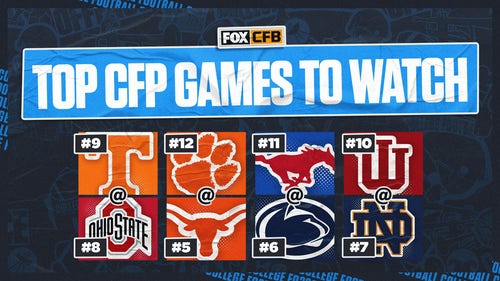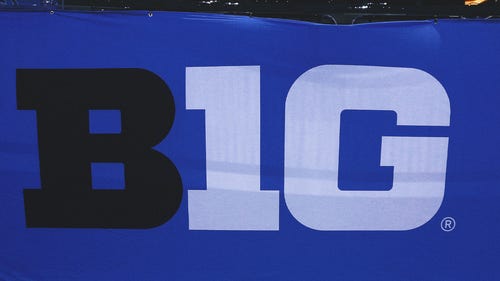
UF president influential during push for playoff
GAINESVILLE, Fla. – The day many college football fans thought they would never see – at least not while they still could see – finally arrived late Tuesday.
A college football playoff system became reality when Virginia Tech president Charles Steger stepped in front of a wall of TV cameras at a Washington, D.C., hotel and announced that the wait was over.
You may have recognized a familiar face standing behind Steger on TV. That was University of Florida president Bernie Machen, one of 12 university presidents, 11 conference commissioners and one athletic director on a committee to come up with the best possible playoff system.
Machen’s involvement wasn’t by accident.
He said Wednesday his interest in a college football playoff system spiked in late 2006 when the Gators, after soundly beating Arkansas in the SEC Championship Game to improve to 11-1, remained uncertain whether they would get to play No. 1-ranked Ohio State in the 2007 BCS Championship Game.
Michigan and Florida each had one loss – Michigan lost a No. 1 vs. No. 2 matchup to the top-ranked Buckeyes to close the regular season – and some lobbied for a Michigan-Ohio State rematch in the title game. The human voters preferred the Gators, though, and in the final BCS computer rankings Florida jumped Michigan.
The Gators then went on to thump Ohio State 41-14 for the program’s second national title. Still, the uncertainty of the situation led Machen to become a bigger proponent for a college football playoff system to determine the national champion.
"Here we played a great schedule, we win our league, and we’re not even guaranteed that we’re going to the national championship,’’ Machen said. "There are lots of examples to me where the system needed to be pushed toward a playoff.
"This takes it all out. The best four teams – we know who they are going in and you also know that if you win your semifinal that you will play for the championship."
The playoff system the committee unveiled Tuesday is a 12-year deal with six bowls rotating as semifinal hosts. The championship game will be hosted by cities that submit the most favorable bids. There remain details to be worked out – a name for the playoff system for one – and the approval of the formation of a selection committee to choose the final field.
The system is one Machen, SEC commissioner Mike Slive and others around the conference favored, specifically that the top four teams – regardless of conference – will be represented and that the current bowl system will remain a part of the playoff.
"There was some compromise all around,’’ Machen said. "Some people compromised on whether it was going to be formulaic or selection committee. Some people compromised on ‘in the bowls, outside the bowls.’ Some compromised on whether it was going to be conference champions or best four. So I think everybody, when we got around the table, realized that this plan to work had to have a consensus built around it.
"By the time we got to the end when the commissioners presented it to us, some people said, ‘Well, why didn’t we have four choices?’ Well, the truth was there wasn’t but one choice when we got to the end because there was a consensus that was built up."
In the wake of Tuesday evening’s announcement, there has already been a debate whether the playoff system should have been expanded to include eight or perhaps even as many as 16 teams. Machen addressed those calls for more teams.
"We had several issues we were working on: No. 1, we don’t want to undermine the regular season. We think that unlike other sports, including pro sports, the regular season means a lot in college football. That is why it’s such a popular sport. Every game has some value. We didn’t want to mess that up. If you went to an eight- or 16-game schedule, then you would have to chop off some of the regular schedule.
"No. 2, we didn’t want to do away with the bowls. The bowls have been very important to college football and really added a lot as we’ve matured. And the third thing is we didn’t want our kids to have to play 16, 17 games. Here we are studying head injuries and concussions and talking about limiting contact. How could we look ourselves in the mirror if we added a playoff system that added significantly more games to the playing year?"
A key component in the new playoff model for the SEC is the addition of the Champions Bowl, which will pit the top team from the SEC each year not in the top four of the playoff against the Big 12’s best team not in the final four.
The league is working to finalize a TV deal that will ensure the game is shown nationally immediately after the Rose Bowl. The game also opens up an additional revenue stream for the league when it is not one of the national semifinals.
"That’s a huge new gift for the Southeastern Conference,’’ Machen said. "It’s a very important part of our strategy. We want to lock in New Year’s Day where we play immediately after the Rose Bowl every year. That is a game that is controlled by our league, not by a bowl."
Florida athletic director Jeremy Foley often uses the phrase "the Gators just got better" when making a new hire. In his view college football just got better with the addition with the creation of the playoff system.
"There has been a lot of work done on a variety of levels to make this happen, but the conference commissioners and BCS Presidential Oversight Committee should be congratulated for their work in bringing this concept to fruition,’’ Foley said. "We are pleased to hear that the Bowls will remain a key element of postseason football."
A couple of other highlights pointed out by Machen:
--A school must meet the 930 minimum APR to be eligible to play in the six bowls rotating as the national semifinals. "We are going to tie that participation revenue to the APR,’’ he said.
--The revenue the SEC produces from the Champions Bowl will be split evenly among the conference’s 14 schools in line with current revenue-sharing models.
The new playoff system won’t be in place until the 2014 season. Machen recently announced he is retiring from his post at UF at the end of 2013.
With his name closely aligned to the creation of a college football’s first playoff system, will Machen be in attendance at the inaugural championship game? And what would Machen like his legacy to be in relation to the new format to determine college football’s national champion?
"If I do it will be just as a fan,’’ he quipped. "There will always be complaints on who is going to be four, who is going to be five. Controversy will still be there but I think everyone will feel better about there being a true playoff now.
"We’ll see whether it’s an anchor or a laurel around my neck."









